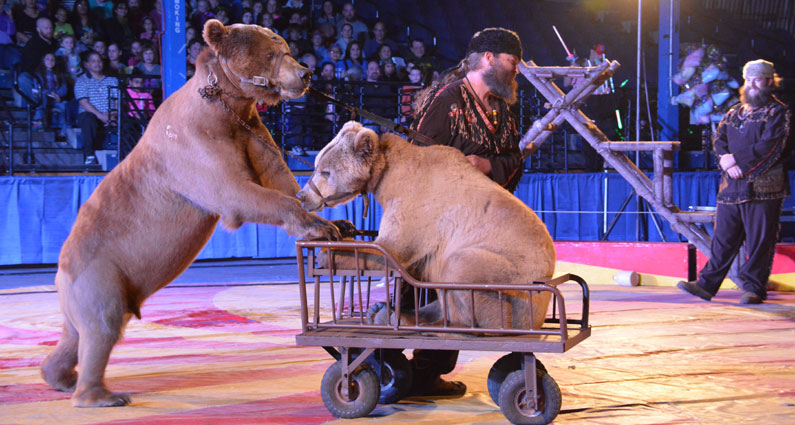June 2, 2016 | News & Information
When a USDA inspector stopped by the Aleppo Shriners Circus in Wilmington, Massachusetts on April 22, she found that the main source of food for two adult brown bears was “a large amount of bread.” The bears, owned by Florida-based Rosaire’s Bears, perform a depressing circus act muzzled and chained (see below photo).
The inspector noted that bread does not meet the nutritional requirements of adult brown bears. To correct the violation, the bear’s owner made a quick trip to the grocery store. The inspector wrote in her report, “The licensee corrected this item at the time of inspection by going to store and bringing back a large amount of fresh fruits and vegetables.”
It is common for animals in traveling circuses to suffer from poor nutrition. The food that bears, tigers and other animals receive is often based on economic rather than nutritional requirements.

May 26, 2016 | News & Information
Primate Products, a laboratory animal supplier in Immokalee, has filed a lawsuit against the Florida Department of Agriculture and Consumer Services in an attempt to prevent the release of health certificates and other records its claims contain “trade secrets.” Curiously, in the lawsuit Primate Products claims that it first learned the department was keeping copies of the certificates in December 2014. That was the month that ARFF released our latest summary of Primate Products customers, which we compiled from records received from the Department of Agriculture in response to a public records request. It is curious because ARFF released similar summaries in 2013, 2012 and 2011. (ARFF is not mentioned in the lawsuit.)
We hope that the Florida Department of Agriculture and Consumer Services will vigorously defend itself against Primate Products’ lawsuit, and defend the public’s right of access to governmental records.
March 31, 2016 | News & Information
For many years, ARFF has called for the retirement of Cora, an Asian elephant owned by Bill Morris of Gibsonton, Florida. ARFF believes that Cora is over 60 years old. She may be the oldest elephant still traveling and performing in the country. The below photo is of Cora at this year’s Collier County Fair in Naples. The fair ended on Sunday, March 27. According to reports, Bill Morris died on Sunday. It is not known what his death will mean for Cora.

January 29, 2016 | News & Information
Two Shrine temples in Florida that have sponsored annual circuses for many, many years are responding to declining membership and revenues by putting their properties up for sale. Orlando’s Bahia Shriners and the Amara Shriners of Palm Beach Gardens have both listed their building and property for sale.

The Bahia Shriners have come to the conclusion that their building is too big. A resolution adopted in November explained, “The membership has declined over the years and the dues cannot support the operations of the building.” The potential sale of the Amara Shriners’ large grass lot next to their temple building is especially encouraging, since the lot was used each year by the circus to set up its big top. ARFF is hopeful that the temple will not host a circus in 2016.
The fraternal organization needs to improve its image and attract new members. Getting rid of cruel animal circuses would be a good step toward turning around a struggling organization.
December 31, 2015 | News & Information
This week The Florida Times-Union profiled the St. Augustine Wild Reserve, a nonprofit wildlife sanctuary. Its founder Deborah Warrick spoke to the paper about two male ligers, who arrived at the sanctuary from The Institute of Greatly Endangered and Rare Species (T.I.G.E.R.S.). “They were no longer needed for the shows, so they gave them to us,” Warrick said.
T.I.G.E.R.S., which produces exploitive animal shows at Jungle Island in Miami, is known for its irresponsible breeding of animals such as white tigers and “ligers” (tiger/lion hybrids). In 2014 they made a big deal about the birth of a litter of ligers. Sadly, it appears that once the animals got too large to be used in money-making shows and photo-ops, they were discarded.
Warrick also mentioned the health problems that many hybrid big cats suffer from: “You can see when they walk that they have bad hips. It’s just not a good thing to do, to produce a hybrid like this.”
November 6, 2015 | News & Information
On September 21, the U.S. Department of Agriculture conducted a routine inspection at Animal Adventures, a private zoo in Okeechobee. The inspector found shocking violations of federal regulations:
 An adult lion with a life threatening medical condition (pyometra) was not seen by a veterinarian. The lion’s condition deteriorated and she was euthanized by a gunshot to the head. The USDA cited Animal Adventures for inadequate veterinary care for failing to have the lion examined and her condition treated. The facility was also cited for using a firearm, when “other more acceptable methods are available.” Gunshot can be a humane method of euthanasia, but only if performed by well trained and experienced personnel with an appropriate firearm.
An adult lion with a life threatening medical condition (pyometra) was not seen by a veterinarian. The lion’s condition deteriorated and she was euthanized by a gunshot to the head. The USDA cited Animal Adventures for inadequate veterinary care for failing to have the lion examined and her condition treated. The facility was also cited for using a firearm, when “other more acceptable methods are available.” Gunshot can be a humane method of euthanasia, but only if performed by well trained and experienced personnel with an appropriate firearm.- A female tiger cub was found injured on the morning of August 28. The veterinarian, via telephone, prescribed medications but the cub’s health deteriorated and she died later that day. Again, Animal Adventures was cited for inadequate veterinary care for failing to have the cub examined and treated by a veterinarian.
- A solitary brown lemur was found housed inside a barn without being able to see or hear any other animal. “When first observed,” the USDA inspector wrote, “this animal was doing repetitive backflips which could be indicative of psychological distress.”
- The USDA inspector also reported that a red fox was suffering from a serious eye condition that was not being treated, and that shelters for bobcats, tigers and bears were badly damaged and hazardous to the animals.
These are only the latest in a long list of animal deaths and other problems at Animal Adventures. In 2013, Animal Adventures agreed to pay a $4,107 fine to settle allegations that it violated the Animal Welfare Act.




